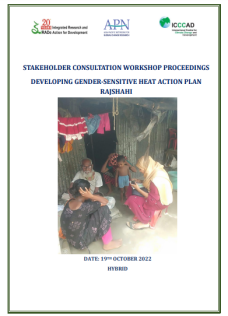South Asia is a hotspot for Heatwave related incidences. Between 1979 and 2017, the extreme combinations of heat and humidity doubled in much of India, Bangladesh, and Pakistan. In some parts, summer temperatures are projected to increase by 3°C–6°C by 2100. Around 800 million South Asians live in heat “hotspots” that will face worse heatwaves in the future. However, there is a lack of a focused strategy to develop heat adaptation plans that local administrations can implement. To minimize heat stress’s impact on health, work productivity, and livelihoods of the economically and socially marginalized population especially women, there is an urgent need for multi-disciplinary research. This proposal calls for capacity building and action research that will establish approaches to inform pathways required at the city, state, and national levels to deal with the risks of heat stress focussing on the vulnerable population. The project will engage with the key decision-makers/policymakers and stakeholders to evolve and disseminate knowledge and build the capacity of the stakeholders for designing spatially differentiated and gender-sensitive Heat Adaptation Plans (HAP) for India, Bangladesh, and Sri Lanka. The project will increase people’s resilience to heat stress, reduce the cost of adaptation and impacts. It will help the cities in developing the capacity of the city administration, increase awareness and knowledge among policy-makers, and communicate to the stakeholders.
Project leader
Collaborators
Project publications

Webinar Proceedings: Heatwave Early Warning and Heat Action Plans in South Asia

Webinar Summary: Heatwave Early Warning and Heat Action Plans in South Asia

Climate adaptive and gender integrated heat wave action plan of Surat City, India

Vulnerability assessment of households in Colombo, Sri Lanka, to heat stress

Urban heat island maps of Surat, India, and Rajshahi, Bangladesh

Training Manual: Developing climate adaptive and gender integrated heat action plans

Factsheet: Rajshahi City, Bangladesh

Factsheet: Colombo City, Sri Lanka

Stakeholder Consultation Workshop (Rajshahi, Bangladesh): Developing gender-sensitive heat action plan

Stakeholder Consultation Workshop (Surat, India): Developing gender-sensitive heat action plan

Colombo Municipal Council, Sri Lanka: Integrating heat stress management into climate policies and guidelines for gender-sensitive heat action plans in Sri Lanka



